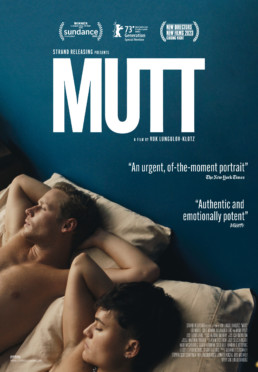Mutt
There's a lyrical quality to 'Mutt', which captures a long day in the life of a trans man navigating through his past in New York.
The word “mutt” is one that typically refers to a dog that doesn’t belong to an officially recognized breed. It also brings to mind thoughts of someone who feels lost, unloved, and without a home. That feeling of loneliness–as a result of one’s mixed identity–is at the heart of the new film, Mutt, a heartfelt and revealing look at the modern trans experience.
The film follows one long day in the life of Feña (Lio Mehiel), a young trans male struggling to get by in New York City. We follow Feña over one night that spills into the day as he encounters a number of people from his life, present and past. That includes his ex-boyfriend (Cole Doman), younger sister (MiMi Ryder), and father (Alejandro Goic) who struggles to understand the transition his former daughter took to realize his male self.
All of these moments are stitched together by the struggles most young people face, like getting locked out of your house or knocking your head after hopping over a subway turnstile that you can’t pay for. They’re small trivialities but for Feña, they speak to his larger struggle, which is simply living life as a trans person.
There’s a lyrical quality to Mutt. Something that doesn’t feel exactly “real,” but more dreamlike and poetic. Written and directed by Vuk Lungulov-Klotz, the film is structured by scenes of running into the most important people in your life and then being able to have real, deep, sometimes uncomfortable conversations with them about things we struggle to understand or come to terms with.
Being his first feature-length film, Vuk Lungulov-Klotz’s script is incredibly perceptive, honest, and bravely written (it also feels like it must have been a cathartic experience to write). Comprised mainly of two-person scenes, the dialogue feels written to intentionally reveal a lot about what it is like to be trans. These questions and topics that arise naturally in the story feel like a gateway for introducing these ideas to larger audiences, which is incredibly important.
The shooting style is quite artful to complement the captivating writing. Mutt captures stretches of dialogue in long, single takes, and from far away. Watching scenes from corners feels like we’re peering into something real. Director of Photography Matthew Pothier also captures New York City’s raw and dangerous energy, where dark shadows are cast on characters to allow them to either thrive or hide behind.
In the lead role of Feña, Lio Mehiel is absolutely magnetic and commands the screen at every point. His anxieties and insecurities make Feña a character that audiences will no doubt connect with. Whether displaying the discomfort of having to take his shirt off in front of his ex, or the frustration felt over a father who still can’t understand his transition, it is a commanding lead performance that holds the whole movie together.
While some might not lock into its sprawling, slower-moving story, Mutt is deeply emotive and artful and offers a very important perspective on the trans experience that should make people of all kinds feel loved and hopefully less alone.
87minutes. Not rated.
Ryan Rojas
Ryan is the editorial manager of Cinemacy, which he co-runs with his older sister, Morgan. Ryan is a member of the Hollywood Critics Association. Ryan's favorite films include 2001: A Space Odyssey, The Social Network, and The Master.


